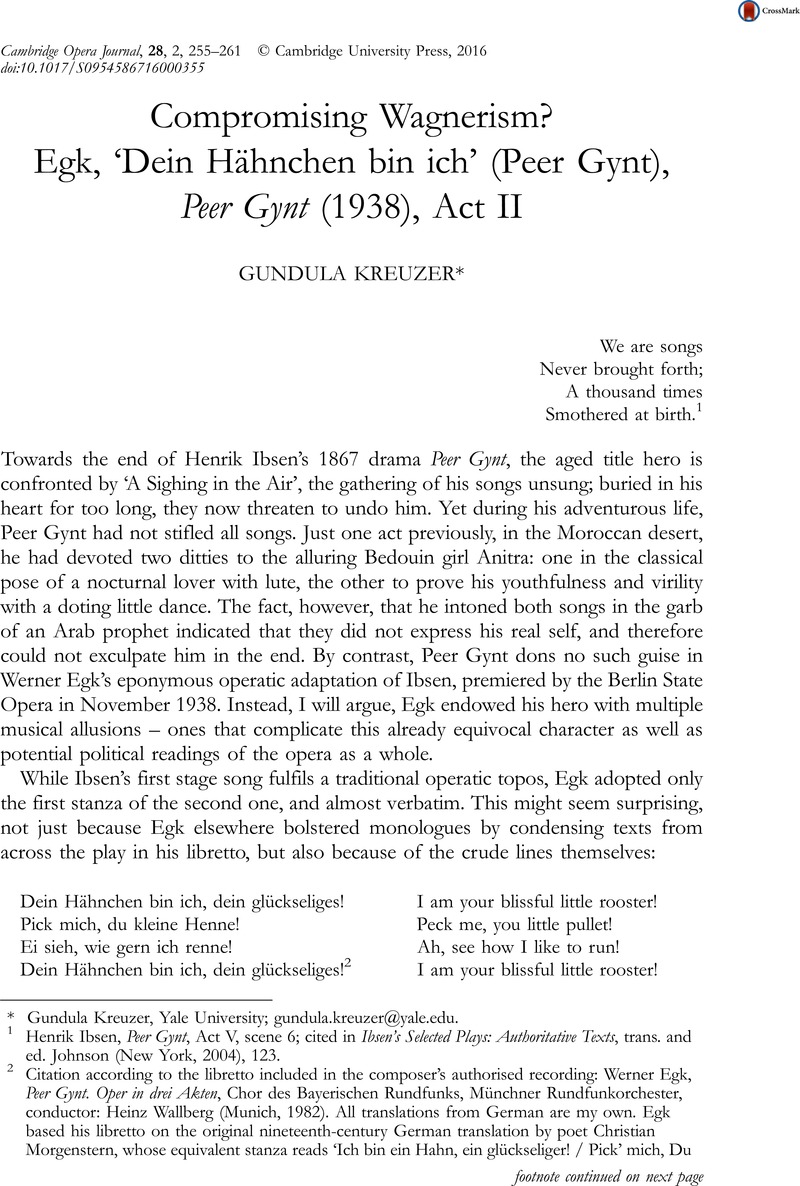No CrossRef data available.
Article contents
Compromising Wagnerism? Egk, ‘Dein Hähnchen bin ich’ (Peer Gynt), Peer Gynt (1938), Act II
Published online by Cambridge University Press: 28 September 2016
Abstract

- Type
- Research Article
- Information
- Cambridge Opera Journal , Volume 28 , Special Issue 2: Special Issue: Remaking the Aria , July 2016 , pp. 255 - 261
- Copyright
- © Cambridge University Press 2016
Footnotes
Gundula Kreuzer, Yale University; gundula.kreuzer@yale.edu.
References
1 Ibsen, Henrik, Peer Gynt, Act V, scene 6; cited in Ibsen’s Selected Plays: Authoritative Texts, trans. and ed. Johnson (New York, 2004), 123 Google Scholar.
2 Citation according to the libretto included in the composer’s authorised recording: Werner Egk, Peer Gynt. Oper in drei Akten, Chor des Bayerischen Rundfunks, Münchner Rundfunkorchester, conductor: Heinz Wallberg (Munich, 1982). All translations from German are my own. Egk based his libretto on the original nineteenth-century German translation by poet Christian Morgenstern, whose equivalent stanza reads ‘Ich bin ein Hahn, ein glückseliger! / Pick’ mich, Du kleine Henne! / Ei! Hopp! Da schau, wie ich renne; - / Ich bin ein Hahn, ein glückseliger!’ See Henrik Ibsen, Peer Gynt, trans. Christian Morgenstern (Berlin, n.d.); cited according to Die Bibliothek der Weltliteratur, CD-ROM, Digitale Bibliothek 89 (Berlin, 2003), 40439.
3 Ibsen’s Selected Plays, 84, 88.
4 Egk, Werner, Peer Gynt. Oper in drei Akten in freier Nachgestaltung nach Ibsen, Klavierauszug Hans Bergese (Mainz etc., 1938; repr. 1966), 163 Google Scholar (‘er macht sich ungemein lächerlich’). All further references to Egk’s opera are to this score.
5 On the exceptional nature of this stage song, see also Palm-Beulich, Helga, ‘Welttheater in sieben Akten. Zu den Opern von Werner Egk’, in Werner Egk, ed. Alfred Böswald et al., Komponisten in Bayern 29 (Tutzing, 1997), 93 Google Scholar (who describes it as a tarantella); Toussaint, Ulrike, Studien zu den Opern Werner Egks (Mainz, 2005), 120 Google Scholar, associates it with a bolero.
6 On this lying stage song, see my essay ‘Deception on Stage: Don Carlos di Vargas and Franz Werfel’s Politics of Operatic Translation’, in Music, Theatre and Politics in Germany: 1848 to the Third Reich, ed. Nikolaus Bacht (Aldershot, 2006), 141–7.
7 Egk, Peer Gynt, 163. Compare Wagner, Richard, Die Meistersinger von Nürnberg, Klavierauszug nach dem Text der Richard-Wagner-Gesamtausgabe (Mainz etc., 2012), 600–610 Google Scholar.
8 Egk omitted the scene in the Cairo madhouse, the pinnacle of Peer’s decline in Ibsen.
9 A survey of contemporary reviews can be found in Walter, Michael, Hitler in der Oper: Deutsches Musikleben 1919–1945 (Stuttgart/Weimar, 2000), 202–212 CrossRefGoogle Scholar. For a reading of the troll scene as subversive, see Levi, Erik, ‘Towards an Aesthetic of Fascist Opera’, in Fascism and Theatre: Comparative Studies on the Aesthetics and Politics of Performance in Europe, 1925–1945, ed. Günther Berghaus (Providence, 1996), 266–267 Google Scholar. Egk himself retrospectively claimed a subversive intention when reporting that, in a press conference preceding the opera’s premiere, he had suggested costuming a leading troll like a general (something he in turn associated with the Nazi military leader Hermann Göring); see Egk, Werner, Die Zeit wartet nicht (Percha, 1973), 301–302 Google Scholar. On this episode and contemporary reactions, see Hobratschk, Jason P., ‘Werner Egk and Joan von Zarissa: Music as Politics and Propaganda under National Sozialism’, PhD diss., Florida State University (2011), 67–85 Google Scholar.
10 Dennis, David B., ‘“The Most German of all German Operas”: Die Meistersinger Through the Lens of the Third Reich’, in Wagner’s Meistersinger: Performance, History, Representation, ed. Nicholas Vazsonyi (Rochester, 2002), 98–119 Google Scholar, esp. 103.
11 Egk, Peer Gynt, 10–11. Alberich denounces the three Rhinemaidens as ‘liederlich schlechtes Gelichter’ (‘wantonly bad rabble’): Wagner, Richard, Der Ring des Nibelungen… Vorabend: Das Rheingold…, Klavierauszug nach dem Text der Richard Wagner-Gesamtausgabe (Mainz etc., 2010), 36 Google Scholar.
12 Egk, Peer Gynt, 15 (‘Ihr Angesicht, das nie geseh’ne, wie ist’s mir vertraut, als hätt’ ich lang zuvor ihr Bild geschaut’). Compare Wagner, Der fliegende Holländer, Act II, scene 3 (‘Wie aus der Ferne längst vergangner Zeiten, spricht dieses Mädchens Bild zu mir; wie ich’s geträumt seit bangen Ewigkeiten, vor meinen Augen seh’ ich’s hier’), in Wagner, Der fliegende Holländer, Klavierauszug nach dem Text der Richard Wagner-Gesamtausgabe (Mainz etc., 2011), 179.
13 Egk, Peer Gynt, 171–80.
14 This link has been noted by Palm-Beulich, ‘Welttheater in sieben Akten’, 97.
15 On Ibsen’s fate during the Nazi era and the high performance numbers of Peer Gynt in particular, see Rischbieter, Henning, ed., Theater im ‘Dritten Reich’: Theaterpolitik, Spielplanstruktur, NS-Dramatik (Seelze-Velber, 2000), 367–368 Google Scholar. Although Peer Gynt’s weak character was anathema to some Nazi critics, the drama’s popularity was bolstered by its Nordic origin and entertainment value, as well as by the free adaptation at the hands of Hitler’s former mentor Dietrich Eckart, which polarised the idealistic Peer and the corrupting modernist (and American) influences on him; see Englert, Uwe, ‘Ibsen and Theatre Life in Nazi Germany’, Contemporary Approaches to Ibsen 7 (1991), 85–100 Google Scholar. It may be telling that Egk did not base his libretto on this recently promoted translation.
16 Egk, Die Zeit wartet nicht, 303.




